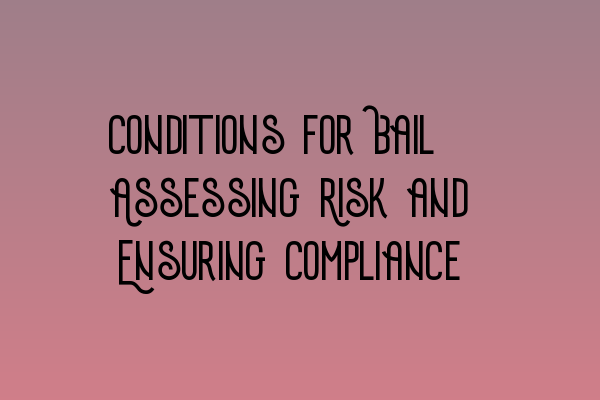Conditions for Bail: Assessing Risk and Ensuring Compliance
At SQE Criminal Law & Practice Law UK, we understand the importance of bail conditions when it comes to assessing the risk posed by an individual and ensuring their compliance with the legal system. Bail conditions serve as a crucial tool in maintaining public safety while also protecting the rights of the accused.
When considering whether to grant bail, a court must carefully assess the risks associated with releasing an individual back into the community. The primary concern is to prevent any potential harm to the public, witnesses, or victims. In order to achieve this, bail conditions are set to address these concerns and minimize the risks involved.
Assessing Risk
The assessment of risk plays a pivotal role in determining the conditions for bail. This assessment is usually conducted by a judge or a magistrate, who considers various factors to determine the potential risks associated with granting bail.
Some key factors that are taken into account include:
- The seriousness of the alleged offense
- The individual’s criminal history
- The likelihood of the individual committing further offenses
- The threat the individual poses to the safety of others
By carefully considering these factors, the court can make an informed decision regarding the conditions for bail that are necessary to mitigate the identified risks.
Ensuring Compliance
Once bail has been granted, it is imperative to ensure the individual’s compliance with the conditions set by the court. Failure to comply with these conditions can lead to the revocation of bail and the individual being remanded back into custody.
To ensure compliance, bail conditions may include:
- Regular reporting to a designated police station
- Prohibition from contacting certain individuals
- Prohibition from visiting specific locations
- Restrictions on travel
- Requirements to surrender travel documents
- Electronic monitoring
By imposing these conditions, the court can closely monitor the individual’s activities and reduce the risk of them reoffending or interfering with the case.
Furthermore, technological advancements have provided additional tools to ensure compliance with bail conditions. Electronic monitoring devices, such as GPS tracking, can be used to track an individual’s movements and provide real-time data to law enforcement authorities.
At SQE Criminal Law & Practice Law UK, we understand the importance of staying up-to-date with the latest developments in criminal law. Our SQE 1 Practice Exam Questions and SQE 1 Practice Mocks FLK1 FLK2 articles provide valuable resources for individuals preparing for the SQE 1 exams.
In addition, we offer SQE 1 Preparation Courses and SQE 2 Preparation Courses to help aspiring solicitors excel in their legal journey. These courses cover a wide range of topics, including bail procedures and risk assessment.
For more information on the SRA SQE exam dates, please refer to our article that provides comprehensive details on the upcoming examination schedule.
At SQE Criminal Law & Practice Law UK, we are dedicated to providing expert legal services and resources to support your success in the field of criminal law. Our team of experienced solicitors is here to assist you every step of the way.
